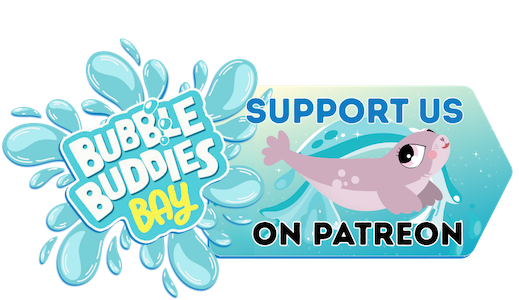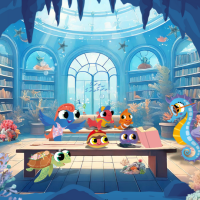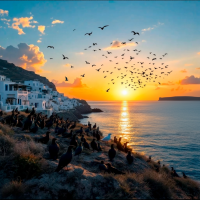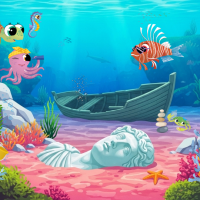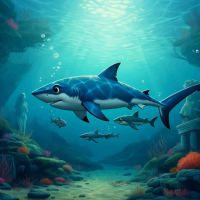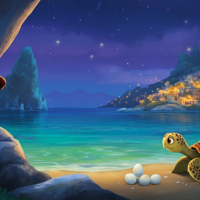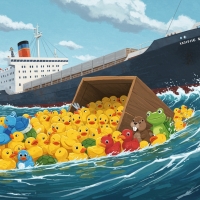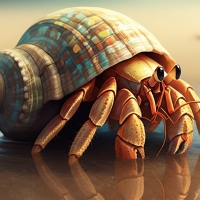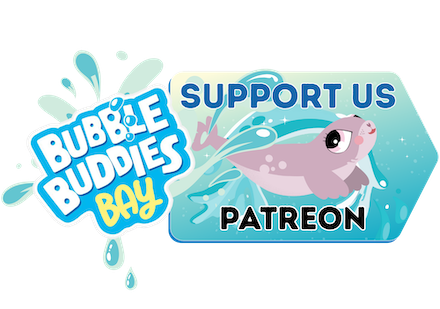
The Eighth Continent: The Great Pacific Garbage Patch
Hello, my friends! As you know, I live in the big, beautiful Mediterranean Sea. But today I'm going to take you on a trip to the Great Pacific Garbage Patch, a huge, floating island of plastic in the North Pacific Ocean.
![]()
The Ocean's Giant Rubbish Islands!
This giant island made of rubbish floating in the ocean is real! It's a huge, messy problem. It is mainly made of plastic: and some of the plastic found in the Patch is more than 50 years old.
Some grown-ups even call it the "Eighth Continent" because it's so big! Just to say, the number of continents always confuses me. Sometimes people say five, sometimes more!
Imagine a place three times bigger than a whole country like France, just filled with millions of pieces of plastic and all sorts of rubbish. That's how enormous the Great Pacific Garbage Patch is! It's floating way out in the big Pacific Ocean, somewhere between sunny California and lovely Hawaii.
And guess what? If we don’t change things, the amount of plastic in the ocean could become three times worse by 2040! Which would make the Great Pacific Garbage Patch nine times the size of France! 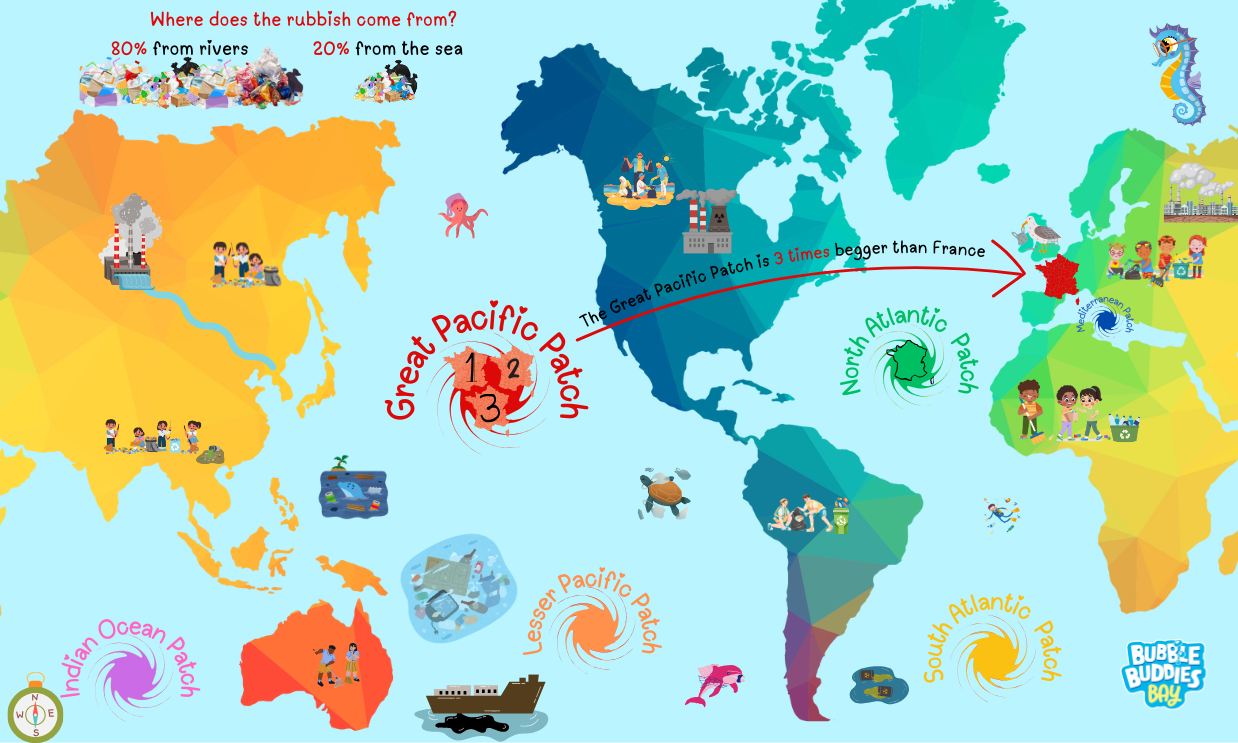
Where Does All That Rubbish Come From?
Well, the ocean has these amazing underwater rivers called currents that move water all around the world. Sometimes, they carry rubbish along with them. All that rubbish can end up trapped in giant, slow-motion whirlpools called gyres, to form what seems like one huge zone of rubbish.
There are five of these big rubbish whirlpools floating on the surface of Earth’s oceans! You can find them in the Pacific, Atlantic and Indian Oceans.
80 % comes from land, carried by rivers and wind; like litter from cities, or waste from farms and factories. Wind and rivers carry it into the sea.
The rest comes from boats and offshore source, Things like:
- Lost or dumped fishing nets and ropes
- Old gear and plastic pieces from boats
- Spills from big ships
These bits float around and add to the mess!
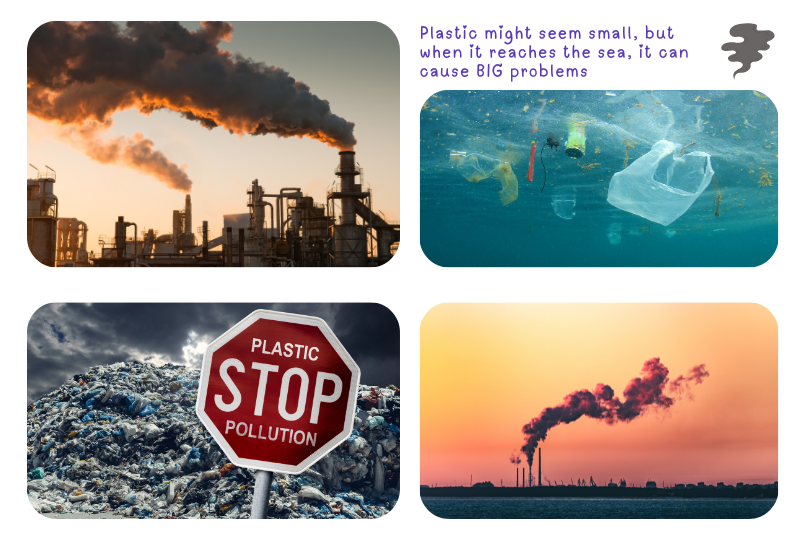
A Mediterranean Mess!
Even in our beautiful Mediterranean Sea, where the beaches are lovely, we have a problem. There is a floating patch of plastic that is longer than several football fields lined up together! It floats between Corsica and Elba islands.
The ocean currents push the rubbish into one spot, and sometimes it washes up on Corsica’s beaches. It doesn’t stay there forever like the Giant Pacific Patch, but it keeps coming back like a bad dream.
Cleaning is Hard Work!
Once plastic gets into these giant ocean whirlpools, it’s almost impossible to remove. Why?
-
The middle of the whirlpools is thousands of kilometres from land.
-
Most plastic sinks, so it’s hard to scoop up.
-
A lot of the plastic breaks into tiny bits called microplastics, which are too small to catch in nets.
Some smart people are inventing ways to clean up the big pieces. But the best way to help is to stop using so much plastic in the first place!
Groups like The Ocean Clean-up are trying to help by using big floating barriers that act like giant nets. These nets catch plastic as it moves through the water. By the middle of 2025, they had already removed over 100,000 kilograms of rubbish, but that’s still only a tiny bit of what’s out there!.
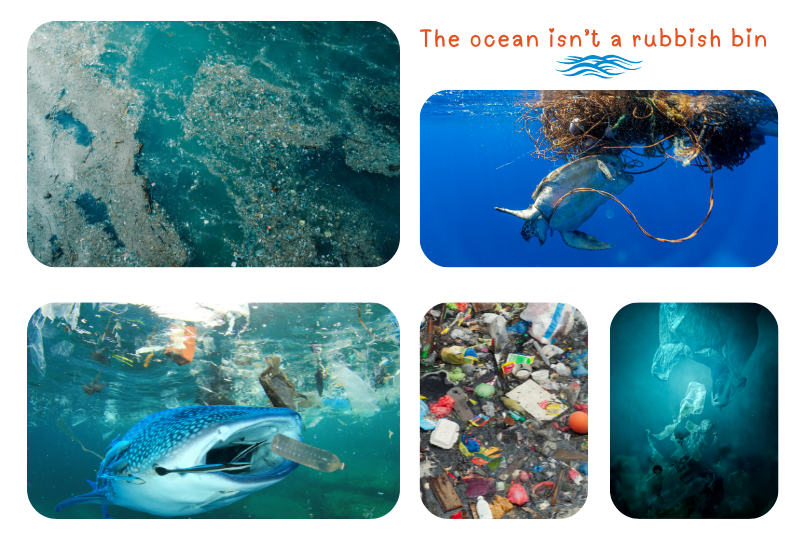
![]()
Why Is It Such a Big Problem?
This giant plastic mess is hurting ocean animals and plants, from tiny plankton to giant whales, from phytoplankton to kelp forests, in many ways:
Getting Tangled: Animals like sea turtles and seabirds can get stuck in plastic nets or bags. It’s like being trapped in a sticky spiderweb.
Eating Rubbish: Some animals think plastic is food, so they fill their tummies and become sick. Some sea turtles living near the Garbage Patch have tummies more than three-quarters full of plastic. And baby seabirds like albatrosses have almost half their body weight made of plastic. Oh, dear!
Living with Plastic: Surprisingly, scientists found lots of tiny sea creatures living on the plastic! Some were even having babies while floating in the ocean, far away from land.
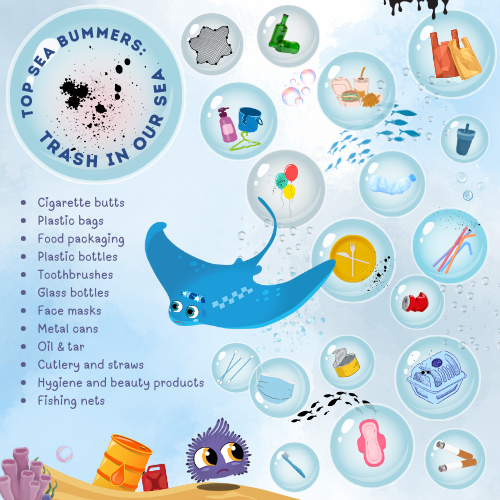
The Hidden Plastic: Most of the plastic in the ocean doesn’t float: it sinks! Out of every 100 pieces of plastic, only one floats. The rest sinks to the ocean floor, where it's very hard to clean up.
What can we do?
-
Make fewer single-use plastics (like bottles and straws).
-
Clean up beaches before rubbish gets into the sea.
-
Ask to design better packaging.
-
Clean up floating plastic in open oceans, though it’s hard because the ocean is so big!
Be a Plastic Detective!
🌀 Plastic Diary: You can be a hero for the ocean. Here’s a fun challenge: For one week, keep a diary of every single plastic item you encounter or use. Write down or draw every plastic thing you use, water bottles, food wrappers, toys, even your toothbrush!
-
What Did You Find? Look back. What did you use the most? Were there any surprises?
-
Plastic Problem Solver: Chat with your family. What reusable things could you use instead?
-
Take Action: Pick one or two things to change, like always bringing your reusable water bottle or lunch box.
Bonus Activities
🌀 The Plastic Collage: Collect different types of plastic (bottles, bags, etc.). Cut them into shapes and create a collage to raise awareness.
🌀 Ocean Poetry: Write a poem or song about ocean pollution and its impact.
🌀 Recycling Club Champions: Start a recycling club at school to encourage classmates to reduce, reuse, and recycle.
🌀 Present Your Findings: Create a presentation or poster to share your learnings with your class.
🌀 Become an Ocean Advocate: Write a letter to a local official expressing your worries about plastic pollution and asking for action.
Remember: Even small changes can make a big difference! By becoming aware of our plastic use and making conscious choices, we can all contribute to a healthier planet.
I love sharing the ocean's secrets with you.
Sophia the Seahorse
